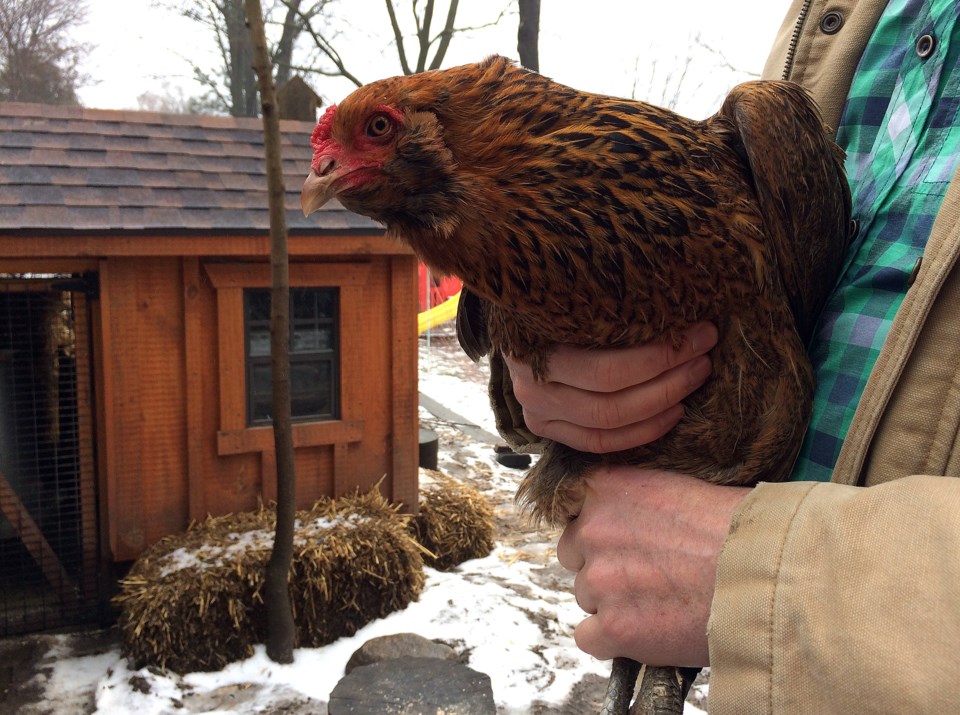A public consultation on whether Greater Sudbury should allow residents to keep backyard hens showed the majority – 64 per cent – are in favour of the idea. But a report on the proposal headed to city council Dec. 11 also says the decision would put a strain on the city's busy bylaw department, and a new full-time staffer would be required at a cost of $94,000.
The debate over backyard chickens began in earnest last June, when councillors received a 500-name petition in favour of the idea. Public consultations were held last month, both through an online survey and nine “chicken chat” public meetings.
“In total, 131 residents attended the in-person community engagement sessions held across the community,” the staff report said. “The highest attendance was registered in Capreol (60 visitors) and the South End of Sudbury (20 visitors).”
Staff also received 14 handwritten comments, which were divided equally among supporters and opponents, as well as four emails from residents who wanted “to further express their opposition to the possibility of hens being permitted on residential properties.”
A total of 3,189 English and 18 French surveys were completed during the public consultations, with 63 per cent in favour and 34 per cent opposed.
“Of the 3,207 residents that took the survey, 48 per cent (1,552 responses) cited nuisance/predatory animals as a concern with allowing backyard hens in residential areas,” the report said. “An equal percentage also had concerns for odour. Concerns for noise was indicated by 38 per cent of residents that took the survey. A total of 688 residents indicated they had no concerns.”
If the idea is approved, 74 per cent said they wanted a limit on the number of chickens people could own, 60 per cent said they wanted a minimum amount of distance between coops and their neighbours, 57 per cent wanted minimum lot sizes for anyone who wants to have a backyard coop. A further 51 per cent want mandatory inspection by the city and 46 per cent want a permit and application process.
“A total of 35 per cent of survey responses indicated that residents would prefer the maximum amount of hens permitted on a residential property to be between one and five,” the report said. “Alternatively, 26 per cent indicated a preference of owning 5-10 hens. Overall, there was a total of 49 per cent of residents that would not want to be notified if their neighbour owned hens; and 43 per cent would want to be notified.”
Consultations with Public Health Sudbury and District found there are six major health risks associated with urban chicken coops: infectious diseases; handling of chicken waste and dead birds; predatory animals and other pests drawn to to coops; noise; and, odour. Steps must also be taken to ensure the especially chicken poop doesn't make its way into the watersheds.
“Mitigation strategies listed refer to proper education of residents, regulation and evaluation by the City of Greater Sudbury,” the report said. “Should city council proceed, Public Health Sudbury & Districts recommends a pilot project. If council opts to allow for backyard chickens in residential areas, further suggestion was that a licensing/registration process be implemented.”
One of the concerns about backyard coops in Northern Ontario compared to the south is the issue of nuisance bears. Sudbury, in particular, has more issues with nuisance bears than any other city in Ontario, the report said. According to the Ministry of Natural Resources and Forestry, it's common for bears to seek out chickens in backyard coops.
“It usually starts with the feed and progresses to predation of the birds when they return looking for more,” the report said. “Further, being low on the food chain, chickens can be a attractant for any number of four-legged or avian predators and once a predator is aware of the food source, they will often return looking for more.”
To deal with this, the ministry says the coops should have electric fencing and chicken feed must be stored indoors where it won't attract bears.
“When constructing or placing a chicken enclosure on a property, MNRF cautioned that residents should try to keep them away from woodlots or potential travel corridors for wildlife.”
In addition to health and other concerns, the impact on the city's bylaw department would be significant, the report said. Their studies have shown there are about 250 illegal backyard coops right now in Greater Sudbury, and 1,200 residents have said they are interested in having a backyard hen.
Having taken over animal control responsibilities from the private sector a couple of years ago, their caseload has increased considerably. Bylaw staff handled a total of 8,278 complaints in the last 12 months, or about 23 a day. That includes six per day related to animal complaints only. With 22,745 staff hours available a year, that gives each officer 2.75 hours to deal with each case, including travel time.
“An addition to the current volume of cases, without an associated increase in employee resources, would result in a negative impact on the current service level,” the report says.
“To address this, if the service is expanded to include the regulation of backyard hens, staff recommend the addition of one dedicated FTE (Junior Bylaw Officer-Group 10/4) and associated operating costs (vehicle, fuel, uniforms, and employee equipment). The cost of the service level enhancement would be approximately $94,000 annually.”
City council will review the report at their meeting Dec. 11.
